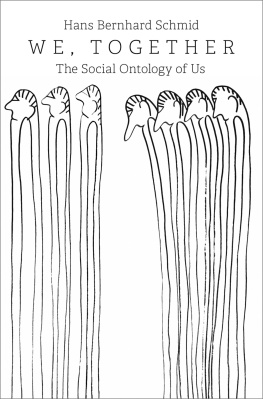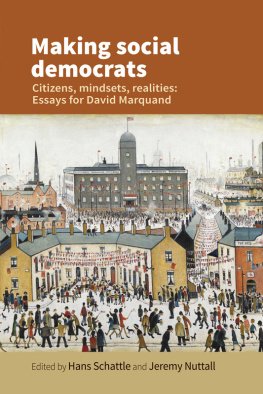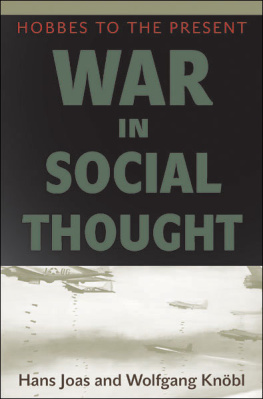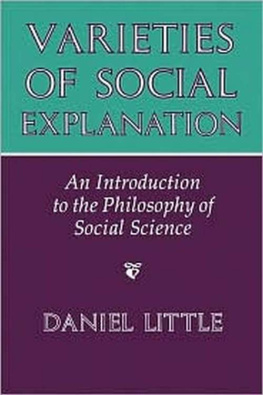ROUTLEDGE LIBRARY EDITIONS:
SOCIAL THEORY
Volume 65
SOCIAL PHILOSOPHY
First published 1981
This edition first published in 2015
by Routledge
2 Park Square, Milton Park, Abingdon, Oxon OX14 4RN
and by Routledge
711 Third Avenue, New York, NY 10017
Routledge is an imprint of the Taylor Francis Group, an informa business
1981 Hans Fink
All rights reserved. No part of this book may be reprinted or reproduced or utilised in any form or by any electronic, mechanical, or other means, now known or hereafter invented, including photocopying and recording, or in any information storage or retrieval system, without permission in writing from the publishers.
Trademark notice: Product or corporate names may be trademarks or registered trademarks, and are used only for identification and explanation without intent to infringe.
British Library Cataloguing in Publication Data
A catalogue record for this book is available from the British Library
ISBN: 978-0-415-72731-0 (set)
eISBN: 978-1-315-76997-4 (Set)
ISBN: 978-1-138-78251-8 (Volume 65)
eISBN: 978-1-315-76338-5 (Volume 65)
Publishers Note
The publisher has gone to great lengths to ensure the quality of this reprint but points out that some imperfections in the original copies may be apparent.
Disclaimer
The publisher has made every effort to trace copyright holders and would welcome correspondence from those they have been unable to trace.
First published in 1981 by
Methuen & Co. Ltd
11 New Fetter Lane,
London EC4P 4EE
Published in the USA by
Methuen & Co.
in association with Methuen, Inc.
733 Third Avenue, New York,
NY 10017
1981 Hans Fink
Printed in Great Britain by
Richard Clay
(The Chaucer Press), Ltd,
Bungay, Suffolk
All rights reserved. No part of this book may be reprinted or reproduced or utilized in any form or by any electronic, mechanical or other means, now known or hereafter invented, including photocopying and recording, or in any information storage or retrieval system, without permission in writing from the publishers.
British Library Cataloguing inPublication Data
Fink, Hans
Social philosophy.
1. Social sciences
1. Title
300. 1 HG1
ISBN 0-416-71990-2
ISBN 0-416 71000-5 Pbk
Contents
The raw manuscript of this book was written in my best English on the basis ofthough by no means as a translation ofa somewhat similar book which I published in Danish in 1975. Jonathan Re went through the manuscript with me, line by line and word by word, and made innumerable corrections and suggestions. I am extremely grateful to him for this and for much else besides. I should also like to thank Asta Fink, Lena Frikke, Jean McCrindle, Johs stergaard Petersen, Kirsten Rajczyk and Helmuth Schiedermann for their help at various stages in the writing of this book.
16 November 1980 H.F.
All of us have experienced quite dramatic social changes in our lifetimes. Our families differ greatly from those of our parents, however anxious we may be to preserve traditional values. Most of those who live on their own or in groups other than families do so in ways which were impossible a generation ago. People who have been working for more than a few years have almost certainly experienced changes in their actual work and working conditions. The unemployed are in a quite different position from that of the unemployed of former decades as they are often reminded. The natural environment has been rearranged and interfered with more thoroughly in the third quarter of this century than ever before. In many countries the political framework has changed fundamentally within living memory, and everywhere the laws we are supposed to obey change more rapidly than ever before, and not only in points of detail. Manhood suffrage without property qualifications was the exception rather than the rule one hundred years ago, and it was our mothers or grandmothers who demanded and got the vote for women. All these changes are part of an immensely complex social process, the origins of which can be traced as far back in prehistory as human knowledge goes, and the process is likely to continue as long again, unless it is abruptly ended by an attempt to defend humanity with nuclear arms.
The social process is the life of human beings, their birth, procreation and death, and their production and distribution which must continue as long as human life continues. Changes in the social process are changes in the conditions of life, in the organization of reproduction, production and distribution and in the ways people experience and conceptualize their lives. We have all lived through changes of this kind and if we look at broader spans of the social process the differences become much greater. A delivery by a caesarean section in a New York clinic is worlds apart from a birth on Manhattan Island in the fifteenth century. Digging worms with a stick for personal consumption is one thing and feeding a computer eight hours a day in order to pay the rent is another. But amidst all these changes people continue to be born, have children, work, exchange goods and services and eventually die irrespective of how they have lived and of the categories in which they have thought about their lives, if, indeed, they have thought about them at all.
Our lives are a continuation of the lives of our forefathers and foremothers; but the material conditions and the social organization of our lives and our ideas about life in society are different from theirs. They are not completely different, though, both because their activity produced material and social structures some of which are still with us, and because their thinking produced ideas and conceptions which form the starting point for our own thinking. Our own activities and thinking are thus heavily dependent upon the past. This past provides the basis on which we can try to make things happen, or react to things happening, in the hope of making things better than they would otherwise be.
There are many different ways in which people may come to feel the need for social change. It may be a vague feeling of personal frustration, or a firm commitment to some theoretical analysis. But if we are to do something effective about it, two things are important. First, we need to know how and why things have come to be the way they are. Second, we should try to ensure that our feelings and commitments are shared by other people, perhaps only a few, but possibly by many thousands if the change which interests us is of wide social significance.
Some ideas of social change suggest a radical break with existing forms of social organization, demanding either a completely new arrangement or a return to the good old days before the rot set in. Others defend the existing order as the best of all possible systems, or at least the least evil, but suggest minor adjustments to ensure its smooth running. But all of them claim to articulate the long-term interests of society as a whole even if some of them obviously express the interests of quite small social groups.
The programmes of political parties and social movements are attempts to formulate consistent platforms or guidelines for joint action. Usually they offer both an attempt at an analysis of the way things are going, and suggestions about desirable ends and means for the future. Social philosophy is about the fundamental issues on which political programmes divide: it is about what the principles of social life ought to be and why. When discussions between, say, liberals and socialists, or between communists and the new left, or between socialists and feminists, are pushed beyond surface polemics, or debates about tactics, they become discussions of social philosophy.







